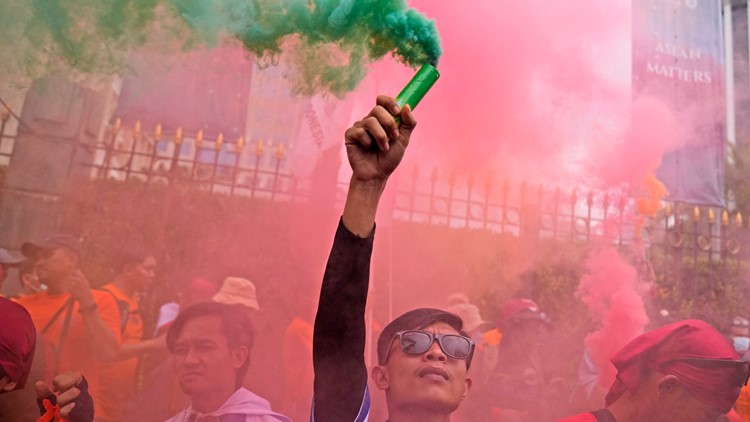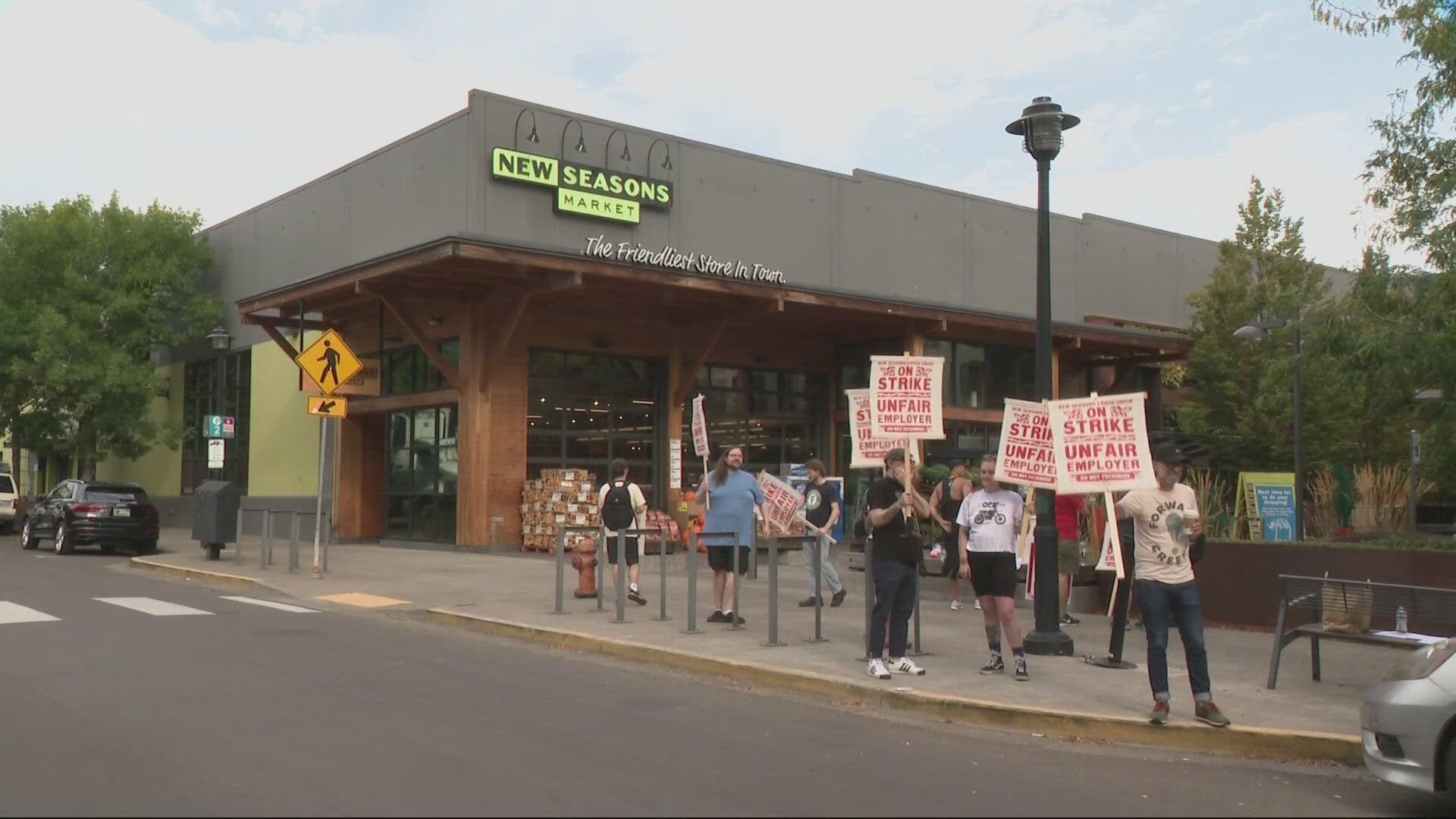SEOUL, South Korea — People squeezed by inflation and demanding economic justice took to streets across Asia and Europe to mark May Day on Monday, in an outpouring of worker discontent from Tokyo to Pakistan to France not seen since before the worldwide COVID-19 lockdowns.
French police charged at radical protesters and troublemakers smashing bank and shop windows and setting fires as unions pushed the president to scrap a higher retirement age. South Koreans pleaded for higher wages. Spanish lawyers demanded the right to take days off. Migrant domestic workers in Lebanon marched in a country plunged into economic crisis.
While May Day is marked around the world as a celebration of labor rights, this year's rallies tapped into broader frustrations. Climate activists spray-painted a Louis Vuitton museum in Paris, and protesters in Germany demonstrated against violence targeting women and LGBTQ+ people.
Celebrations were forced indoors in Pakistan, tinged with political tensions as in Turkey, as both countries face high-stakes elections. Russia's war in Ukraine overshadowed scaled-back events in Moscow, where Communist-led May Day celebrations were once massive affairs.
Across Asia and Europe, this year’s May Day events unleashed pent-up frustration after three years of COVID-19 restrictions.
This year’s events had bigger turnouts than in previous years in Asian cities, as activists in many countries argued governments should do more to improve workers’ lives.
Across France, some 800,000 people marched, Interior Minister Gerald Darmanin said. They mobilized against President Emmanuel Macron’s recent move to raise the retirement age from 62 to 64. Organizers see pension reform as a threat to hard-fought worker rights, while Macron argues it's economically necessary as the population ages.
While marchers were largely peaceful, violence by radicals, an ever-present reality at French marches, marred the message, notably in Paris. French police deployed drones to film unrest. A Paris police officer was seriously injured by a Molotov cocktail, and 19 others were hospitalized, among 108 officers injured around France, Darmanin said. It wasn't known how many protesters were potentially injured.
Clashes also marked protests in Lyon and Nantes.
“Violence is increasingly strong in a society that is radicalizing,” the interior minister said on BFM-TV news station, blaming the ultra-left. He said some 2,000 radicals were at the Paris march.
Tear gas hung over the end point of the Paris march, Place de la Nation, where a huge black cloud rose high above the trees after radicals set two fuel cans afire outside a building renovation site, police said. The fire that blackened the facade was later relit.
French union members were joined by groups fighting for economic justice, or just expressing anger at what is seen as Macron's out-of-touch, pro-business leadership. Labor activists from abroad were present, among them Hyrwon Chong of the South Korean Metal Workers’ Union.
“Today we see rising inequality throughout the world, terrible inflation," she said, adding that Macron's government was trying "to tear down a pillar of the social system which is the pension system.”
Kevin Courtney, joint general secretary of the UK's National Education Union, praised French unions as “an inspiration to working people across Europe.” Like them, “you don’t back down.”
In Northern Macedonia’s capital Skopje, thousands of trade union members protested a recent decision by the government to give ministers a 78% raise. The minimum monthly wage in one of Europe’s poorest countries, is 320 euros ($350), while the hike will put ministers' wages at around 2,300 euros ($2,530). “We are here, not only (to mark) Labor Day, but also to warn that if there is no social justice, there will be no social peace either," said union leader Jakim Nedelkovski.
In Turkey, police prevented demonstrators from reaching Istanbul’s main square, Taksim, and detained around a dozen of them, independent television station Sozcu reported. Journalists trying to film demonstrators were pushed back or detained.
The square has symbolic importance for Turkey’s trade unions after unknown gunmen opened fire on a May Day celebration at Taksim in 1977, causing a stampede that killed dozens. President Recep Tayyip Erdogan’s government has declared Taksim off-limits to demonstrations, though small groups were allowed to enter to lay wreaths at a monument.
In Pakistan, authorities banned rallies in some cities because of a tense security and political atmosphere. In Peshawar, in the country’s restive northwest, labor organizations and trade unions held indoor events to demand better workers’ rights amid high inflation.
Sri Lanka’s opposition political parties and trade unions held workers’ day rallies protesting austerity measures and economic reforms linked to a bailout agreement with the International Monetary Fund. Protesters demanded the government halt moves to privatize state-owned and semi-government businesses. Sri Lanka is facing its worst economic crisis in history and has suspended foreign debt repayments.
More than 70 marches were held across Spain, and powerful unions warned of “social conflict” if low salaries compared to the EU average don't rise in line with inflation.
The Illustrious College of Lawyers of Madrid urged reforms of historic laws that require them to be on call 365 days of the year, regardless of the death of family members or medical emergencies. In recent years, lawyers have tweeted images of themselves working from hospital beds on IV drips to illustrate their plight.
In South Korea, tens of thousands of people attended various rallies in its biggest May Day gatherings since the pandemic began in early 2020.
“The price of everything has increased except for our wages. Increase our minimum wages!” an activist at a Seoul rally shouted at the podium. “Reduce our working hours!”
In Tokyo, thousands of labor union members, opposition lawmakers and academics demanded wage increases to offset the impact of rising costs as they recover from damage from the pandemic. They criticized Japanese Prime Minister Fumio Kishida’s plan to double the defense budget, saying the money should be spent on welfare, social security and improving people’s daily lives.
In Indonesia, demonstrators demanded the government repeal a job creation law they argue would only benefit business.
In Taiwan, thousands of workers protested what they call the inadequacies of the self-ruled island’s labor policies, putting pressure on the ruling party before the 2024 presidential election.
Protests in Germany kicked off with a “Take Back the Night” rally organized by feminist and queer groups on the eve of May Day to protest against violence directed at women and LGBTQ+ people. On Monday, thousands more turned out in marches organizes by Germany labor unions in Berlin, Cologne and other cities with union leaders rejecting recent calls by conservative politicians for restrictions on the right to strike.
Italy’s far-right premier, Giorgia Meloni, made a point of working on Monday — as her Cabinet passed measures on Labor Day that it contends demonstrates concern for workers. But opposition lawmakers and union leaders said the measures do nothing to increase salaries or combat the widespread practice of hiring workers on temporary contracts. Many young people say they can’t contemplate starting families or even move out of parents’ homes because they only get temporary contracts.
Elsewhere, some communities held May Day festivals that harkened back to pagan ceremonies celebrating spring.
In war-ravaged Ukraine, May Day is associated with Soviet-era celebrations when the country was ruled from Moscow — an era that many want forgotten.
“It is good that we don’t celebrate this holiday like it was done during the Bolshevik times. It was something truly awful,” said Anatolii Borsiuk, a 77-year-old in Kyiv.
Alla Liapkina described the flowers and balloons of Soviet May Day gatherings, but said it’s time to move on.
“We live in a new era, and we need to develop in this direction,'' she said. ‘’We don’t need to go back to such a past.”
Charlton contributed from Paris. Associated Press writers Mari Yamaguchi and Yuri Kageyama and in Tokyo, Niniek Karmini in Jakarta, Indonesia, Kanis Leung in Hong Kong, Suzan Fraser in Istanbul, Riazat Butt in Islamabad, Abby Sewell in Beirut, and Jennifer O'Mahoney in Madrid contributed to this report.



